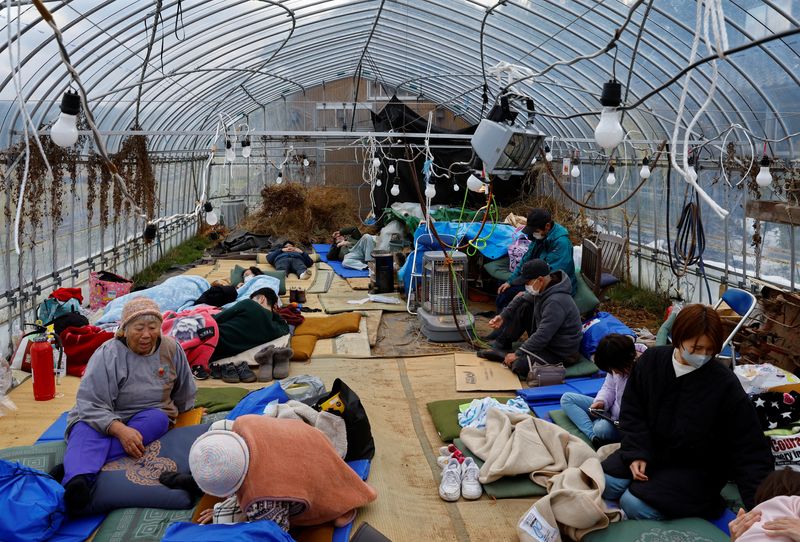Japan quake: survivors face freezing rain, threat of landslides
2024.01.02 22:43
5/5

© Reuters. Evacuated people rest at a green house converted as an evacuation center, in the aftermath of an earthquake, in Wajima, Ishikawa prefecture, Japan January 2, 2024, REUTERS/Kim Kyung-Hoon
2/5
By Kiyoshi Takenaka and Sakura Murakami
KASHIMAJI, Japan (Reuters) -The death toll from a massive earthquake that struck Japan on New Years Day rose to 62 on Wednesday as authorities rushed to bring aid to survivors facing freezing temperatures and heavy rain forecast for later in the day.
The quake with a preliminary magnitude of 7.6 struck the Noto peninsula on Monday afternoon, levelling houses and cutting off remote areas from much-needed aid.
Heavy rains were forecast in the quake-hit areas on Wednesday raising fears of landslides, authorities said, in what could further hinder efforts to free many more trapped under rubble.
Severed roads, damaged infrastructure, and the remote location of the hardest-hit areas have complicated rescue efforts, and the full extent of damage and casualties remains unclear two days after the quake.
In Suzu, a town of just over 5,000 households near the quake’s epicentre, authorities have been unable to respond to 72 calls for help, according to its mayor Masuhiro Izumiya.
Authorities confirmed 62 deaths so far, up from 55 late on Tuesday, making the earthquake the deadliest in Japan since at least 2016.
“It’s been over 40 hours since the initial quake. This is a battle against time, and I believe now is a crucial moment in that battle,” Japanese Prime Minister Fumio Kishida said at a news conference held after a disaster response meeting on Wednesday.
The government opened a sea route to deliver aid and some larger trucks are now able to reach some of the hardest-hit areas, Kishida said.
Mitsuru Kida, 74, a survivor of the earthquake who lives in hard-hit Wajima city, feared a return to life as usual will be time-consuming process.
“The road conditions are terrible. This is the first time the roads have been damaged this badly,” he said at a community building which had been turned into a make-shift evacuation centre.
“I have an impression that most people have yet to regain energy to stand up again at the moment,” he added.
Smaller quakes continue to hit the peninsula. Firefighters searching for survivors in the rubble of a partially collapsed building were seen rushing out to safety as an earthquake warning alarm sounded before noon on Wednesday, according to footage broadcast by public broadcaster NHK.








